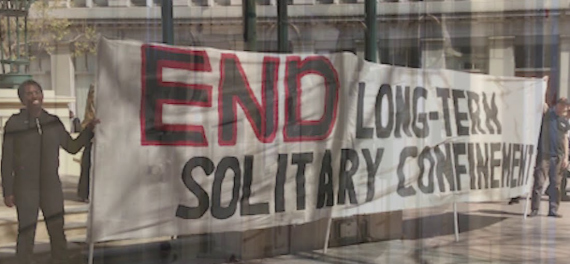Photos: YouTube
Oakland, CA ‒ Men who spent a decade or longer in solitary confinement charged that the California Department of Corrections and Rehabilitation (CDCR) is violating a landmark settlement agreement and continuing to undermine their constitutional rights in a court hearing Thursday.
As part of the case Ashker v. Governor of California, the men’s attorneys asked a district court judge to extend the monitoring period of the settlement for a second time and to order remedies for continued rights violations.
“I suffered through decades in solitary confinement. The trauma we endured continues to impact the mental, emotional, and physical health of all the men California tortured for so long, even those like me who are now out of prison. This court must prevent more torture and also must end the abusive use of confidential information, because there is undisputed evidence showing officials have misused it at disciplinary proceedings, classification hearings, and parole hearings, etc.,”said Paul Redd, a plaintiff in the case who suffered decades of solitary confinement and was released from prison last year.
The 2015 settlement agreement resulted from a class action case that had begun as a lawsuit filed on their own behalf by men held for decades in solitary at Pelican Bay State Prison in Crescent City, California.
The settlement mandated specific reforms and a two-year monitoring period intended to end indefinite solitary confinement and the use of specious findings of gang affiliation as a justification for isolating prisoners. But at the end of the monitoring period, Judge Claudia Wilken, the district court judge in the case, ordered an extension, finding that the CDCR was systemically violating due process rights and “effectively frustrating the purpose” of the settlement agreement. That decision is on appeal.
However, Thursday’s argument was over a magistrate judge’s denial of a request for a second extension. Last year, that judge found civil rights violations were not continuing, despite evidence to the contrary presented by prisoners, and that the case should therefore end.
Jules Lobel, lead counsel for the plaintiffs, stated, “The Ashker case began over a decade ago, as people in prison organized to end the inhumane practice of warehousing human beings in solitary confinement for decades on end. While we have succeeded in forcing California to transfer thousands of men into less restrictive units, there is so much left to do, and California has shown itself unwilling to make those necessary changes without court oversight.”
CDCR is still using fabricated, exaggerated, or inaccurately disclosed confidential information to return men to solitary confinement, plaintiffs say. Imprisoned men are pressured to provide information in exchange for favors and better treatment, and prison officials treat obviously false information as reliable, taking no steps and enacting no safeguards to ascertain the facts. Further, men are often isolated for alleged safety concerns even when an investigation does not conclude they have violated prison rules. At the same time, CDCR continues to impose a de facto bar on parole for men with alleged gang affiliation, providing parole boards with purported evidence of gang affiliation obtained through the unconstitutional process described above. Finally, CDCR places and retains certain men in a restricted unit in the general population without adequate procedural protections. All of this, prisoners and their advocates say, violates their right to due process.
They will ask Judge Wilken both to extend the monitoring period again and to order reforms to guard against violations of their rights, including:
- Audio-recording all confidential interviews when prisoners implicate other prisoners in rule violations;
- Establishing an independent monitor;
- Prohibiting the transmission to the parole board of unreliable information about alleged gang affiliation; and
- Implementing additional layers of review and opportunities for men in prison to appeal certain decisions that result in continued isolation.
“We are asking the court to address ongoing rights violations,” said Carmen Bremer of Bremer Law Group, co-counsel in the case. “One of the top concerns for the people we represent is the ways the system encourages the use of unreliable information to further punish them ‒ we need safeguards, and we need an independent monitor to ensure all the reforms, new and old, are carried out.”
Ashker v. Governor of California amended a lawsuit filed by then-Pelican Bay prisoners Todd Ashker and Danny Troxell, who represented themselves. The class action suit charges that prolonged solitary confinement violates the Eighth Amendment’s prohibition on cruel and unusual punishment, and that the absence of meaningful review for placement violates the prisoners’ rights to due process.
It is part of a larger movement sparked by hunger strikes by thousands of prisoners protesting conditions in Security Housings Units in California prisons. The named plaintiffs in Ashker include several leaders and participants from the hunger strikes.
Co-counsel with the Center for Constitutional Rights are Legal Services for Prisoners with Children, California Prison Focus, Siegel & Yee, Weil Gotshal & Manges LLP, Bremer Law Group, Ellenberg & Hull, the Law Offices of Charles Carbone, and the Law Office of Matthew Strugar.
For more information, visit the Center for Constitutional Rights’ case page.
The Center for Constitutional Rights works with communities under threat to fight for justice and liberation through litigation, advocacy, and strategic communications. Since 1966, the Center for Constitutional Rights has taken on oppressive systems of power, including structural racism, gender oppression, economic inequity, and governmental overreach. Learn more at ccrjustice.org.












